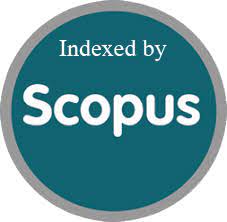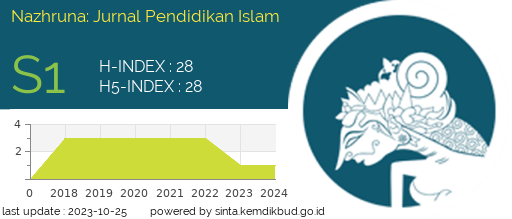Challenges of Islamic Boarding School Organizational Culture in The Millennial Generation and The Digital Era 4.0
Abstract
This research aims to determine the role of the digitalization era as an intervening variable among the millennial generation toward organizational culture in Islamic boarding schools. To find out this, a research question was created which was answered in a hypothesis or temporary research answer, namely that the millennial generation has a significant influence on the organizational culture of Islamic boarding schools. The second hypothesis is that the digital era has a positive and significant influence on organizational culture and the final hypothesis is that the millennial generation has a positive and significant influence on Islamic boarding school organizational culture through the digital era. This research is quantitative research with a survey method, where data is obtained through questionnaires that have been tested for validity and reliability. The research instrument uses a 1-5 Likert scale. In determining the sample from the population using probability sampling using path diagram analysis whose analysis uses structural equation modeling (SEM). The results of the research show that there is a significant influence between the millennial generation on organizational culture, secondly, the digital era has a positive and significant influence on organizational culture and the main finding in this research is that the digital era variable can mediate the millennial generation on organizational culture with its indicators.
Downloads
References
Aditya, Dodiet. “Modul Uji Validitas dan Reliabilitas Instrumen Penelitian.” Modul Statistika, 2014, 1–12.
Aisyah, Siti, Munaya Ulil Ilmi, Muhammad Amirudin Rosyid, Eni Wulandari, dan Fandi Akhmad. “Kiai Leadership Concept in The Scope of Pesantren Organizational Culture.” Tafkir: Interdisciplinary Journal of Islamic Education 3, no. 1 (2022): 40–59. https://doi.org/10.31538/tijie.v3i1.106.
Aliani, Syahrul Ode, Md Shabbir Alam, Ainur Rofiq, dan Fuad Srinio. “The Role of Islamic Religious Counselors in Providing Religious Understanding of Ta’lim Councils in Minority Areas.” Dirasah International Journal of Islamic Studies 1, no. 2 (29 Oktober 2023): 89–101. https://doi.org/10.59373/drs.v1i2.19.
Ansori, Mujahid. “Pengembangan Kurikulum Madrasah Di Pesantren.” Munaddhomah: Jurnal Manajemen Pendidikan Islam 1, no. 1 (2020): 41–50. https://doi.org/10.31538/munaddhomah.v1i1.32.
Arar, Khalid, Rania Sawalhi, dan Munube Yilmaz. “The Research on Islamic-Based Educational Leadership since.” Religions 13, no. 42 (2022): 1–23.
Arifin, Imron, Juharyanto, Mustiningsih, dan Ahmad Taufiq. “Islamic Crash Course as a Leadership Strategy of School Principals in Strengthening School Organizational Culture.” SAGE Open 8, no. 3 (2018). https://doi.org/10.1177/2158244018799849.
———. “Islamic Crash Course as a Leadership Strategy of School Principals in Strengthening School Organizational Culture.” SAGE Open 8, no. 3 (1 Juli 2018): 2158244018799849. https://doi.org/10.1177/2158244018799849.
Arikunto, Suharsimi. Prosedur penelitian : suatu pendekatan praktik. Ed. Rev 20. Jakarta: Rineka Cipta, 2010.
As’ad, Mahrus. “Implementing Life Skill Education in an Environment-Based Pesantren.” Jurnal Pendidikan Islam 8, no. 1 (30 Juni 2022): 15–24. https://doi.org/10.15575/jpi.v8i1.18253.
Asmawati, Luluk. “The Development of Puzzle Games for Early Childhood Based on the Banten Local Culture.” Jurnal Ilmiah Peuradeun 11, no. 2 (30 Mei 2023): 531–50. https://doi.org/10.26811/peuradeun.v11i2.895.
Assa’idi, Sa’dullah. “The Growth of Pesantren in Indonesia as the Islamic Venue and Social Class Status of Santri.” Eurasian Journal of Educational Research, 2021. https://eric.ed.gov/?id=EJ1300132.
Azeem, Muhammad, Munir Ahmed, Sajid Haider, dan Muhammad Sajjad. “Expanding competitive advantage through organizational culture, knowledge sharing and organizational innovation.” Technology in Society 66, no. January (2021): 101635. https://doi.org/10.1016/j.techsoc.2021.101635.
Bakar, Muhammad Abu, Khidriyah Amimatul Umroh, dan Fatima Hameed. “Improving Quality Islamic Education for Today’s Generation.” At-Tadzkir: Islamic Education Journal 2, no. 2 (26 Agustus 2023): 118–28. https://doi.org/10.59373/attadzkir.v2i2.42.
Brooks, Melanie C., dan Miriam D. Ezzani. “Islamic school leadership: advancing a framework for critical spirituality.” International Journal of Qualitative Studies in Education 35, no. 3 (16 Maret 2022): 319–36. https://doi.org/10.1080/09518398.2021.1930265.
Burga, Muhammad Alqadri, dan Muljono Damopolii. “Reinforcing Religious Moderation through Local Culture-Based Pesantren.” Jurnal Pendidikan Islam 8, no. 2 (31 Desember 2022): 145–62. https://doi.org/10.15575/jpi.v8i2.19879.
Clifton, Jim, Chairman and CEO. “How Millennials Want to Work and Live Purpose • Development • Coach • Ongoing Conversations • Strengths • Life THE SIX BIG CHANGES LEADERS HAVE TO MAKE.” Gallup, 2016, 23.
Cornelissen, Joep. Corporate Communication: A Guide to Theory and Practice. Corporate Communication: A Strategic …, 2011.
Dessler, Gary. Manajemen Sumber Daya Manusia. 10 ed. Jakarta: Indeks, 2011.
Eva, Nathan, Mulyadi Robin, Sen Sendjaya, Dirk van Dierendonck, dan Robert C. Liden. “Servant Leadership: A Systematic Review and Call for Future Research.” The Leadership Quarterly 30, no. 1 (1 Februari 2019): 111–32. https://doi.org/10.1016/j.leaqua.2018.07.004.
Fiction, Urban. “Critical Readings : African American Girls.” Journal of Adolescent & Adult literacy 53, no. April (2010): 565–74. https://doi.org/10.1598/JA.
Fidayani, Eka Fitria, dan Farikh Marzuki Ammar. “The Use of Azhari Curriculum in Arabic Language Learning at Islamic Boarding School.” Nazhruna: Jurnal Pendidikan Islam 6, no. 1 (9 Januari 2023): 25–45. https://doi.org/10.31538/nzh.v6i1.2866.
Fitriyana, Fitriyana, Henny Widya Astuti, Abdul Rahman, Rini Werdiningsih, dan Syech Idrus. “Servant Leadership and Perceived Organizational Support for Lecturer Loyalty Through Empowerment.” Tafkir: Interdisciplinary Journal of Islamic Education 4, no. 1 (5 Maret 2023): 113–27. https://doi.org/10.31538/tijie.v4i1.318.
Fuad, Dayang Rafidah Syariff M., Khalip Musa, dan Zahari Hashim. “Innovation Culture in Education: A Systematic Review of the Literature.” Management in Education 36, no. 3 (1 Juli 2022): 135–49. https://doi.org/10.1177/0892020620959760.
Hariyanto, Erie, Abd Hannan, Arif Wahyudi, Eka Susylawati, dan Bhismoadi Tri Wahyu Faizal. “Sakinah Family Empowerment by Optimizing the Role of BP4 and Parents Mental Revolution Perspective.” Samarah: Jurnal Hukum Keluarga Dan Hukum Islam 5, no. 2 (26 Desember 2021): 619–47. https://doi.org/10.22373/sjhk.v5i2.10965.
Hastasari, Chatia, Benni Setiawan, dan Suranto Aw. “Students’ communication patterns of islamic boarding schools: the case of Students in Muallimin Muhammadiyah Yogyakarta.” Heliyon 8, no. 1 (2022): e08824. https://doi.org/10.1016/j.heliyon.2022.e08824.
Honesti, Leli, Edison Hatoguan Manurung, Charles Sitindaon, dan Muji Indarwanto. “Innovation Utilization of Digital Applications Efforts to Improve College Achievement of Civil Engineering Students,” 2012, 10383–92.
Joshi, Ankur, Saket Kale, Satish Chandel, dan D. Pal. “Likert Scale: Explored and Explained.” British Journal of Applied Science & Technology 7, no. 4 (2015): 396–403. https://doi.org/10.9734/bjast/2015/14975.
Judge, Stephen P. Robbins and Timothy A. Perilaku Organisasi. Disunting oleh Ria Cahyani dan Abdul Rosyid Diana Angelica. Edisi 12. Jakarta: Salemba Empat, 2008.
Kardi, Kardi, Hasan Basri, Andewi Suhartini, dan Fitri Meliani. “Challenges of Online Boarding Schools In The Digital Era.” At-tadzkir: Islamic Education Journal 2, no. 1 (2023): 37–51. https://doi.org/10.59373/attadzkir.v2i1.11.
Karim, Abdul, Oman Fathurrohman, Muhammadun, Wahyu Saripudin, Diding Rahmat, dan Firman Mansir. “ Altruistic works, religion, and corruption: Kiai s’ leadership to shape anti-corruption values in pesantren .” Cogent Social Sciences 9, no. 1 (2023). https://doi.org/10.1080/23311886.2023.2238968.
Kartiko, Ari, dan Jaya Roza Azzukhrufi. “Pengaruh Budaya Organisasi Dan Kompensasi Terhadap Kinerja Pendidik Di Madrasah Aliyah Nahdlatul Ulama Mazro’atul Ulum Paciran.” Nidhomul Haq : Jurnal Manajemen Pendidikan Islam 4, no. 2 (2019): 207–26. https://doi.org/10.31538/ndh.v4i2.351.
Kurniawan, Cahya, Lina Cynthia Dewi, Weny Maulatsih, dan Willy Gunadi. “Factors influencing housing purchase decisions of millennial generation in Indonesia.” International Journal of Management 11, no. 4 (2020): 350–65. https://doi.org/10.34218/IJM.11.4.2020.035.
Likert, Rensis. “The Method of Constructing an Attitude Scale.” Routledge, 1974.
Lukens-Bull, Ronald A. “Two Sides of the Same Coin: Modernity and Tradition in Islamic Education in Indonesia.” Anthropology Education Quarterly 32, no. 3 (2001): 350–72. https://doi.org/10.1525/aeq.2001.32.3.350.
Mahfud, Choirul, Rika Astari, Abdurrohman Kasdi, Muhammad Mu’ammar, Muyasaroh Muyasaroh, dan Firdaus Wajdi. “Islamic cultural and Arabic linguistic influence on the languages of Nusantara; From lexical borrowing to localized Islamic lifestyles.” Wacana, Journal of the Humanities of Indonesia 22, no. 1 (30 April 2021). https://doi.org/10.17510/wacana.v22i1.914.
Maulani, Gilang. “Tantangan Generasi Milenial dalam Dunia Kerja.” QuBisa, 24 Januari 2023.
Müller, Sune Dueholm, Nikolaus Obwegeser, Jakob Vang Glud, dan Gunnar Johildarson. “Digital innovation and organizational culture: The case of a danish media company.” Scandinavian Journal of Information Systems 31, no. 2 (2019): 3–34.
Nurhanisah, Yuli. “Usia Muda Dominasi Penduduk Indonesia.” Indonesiabaik.id, 2020.
Nurmawati, Nurmawati, Cheri Julida Panjaitan, dan Khairul Amri. “Measurement of the Parenting Style of the Character of Millennial Students at State Islamic Higher Educational Institutions.” Jurnal Ilmiah Peuradeun 10, no. 3 (30 September 2022): 685–98. https://doi.org/10.26811/peuradeun.v10i3.712.
Pamuji, Zuri, dan Fauzi Fauzi. “Service Innovation Model in Boarding School Programs for New Students at Islamic Higher Education.” Tafkir: Interdisciplinary Journal of Islamic Education 4, no. 2 (5 Juli 2023): 319–34. https://doi.org/10.31538/tijie.v4i2.443.
Paul, Metty, Leandros Maglaras, Mohamed Amine Ferrag, dan Iman Almomani. “Digitization of healthcare sector: A study on privacy and security concerns.” ICT Express 9, no. 4 (2023): 571–88. https://doi.org/10.1016/j.icte.2023.02.007.
Purwanto. Teknik Penyusunan Instrumen Uji Validitas Dan Tealiabilitasi Untuk Penelitian Ekonomi Syariah. Staiapress. Vol. 13, 2018.
Qadri, Syed Usman, Muhammad Amjad Bilal, Mingxing Li, Zhiqiang Ma, Safwan Qadri, Chengang Ye, dan Fawad Rauf. “Work Environment as a Moderator Linking Green Human Resources Management Strategies with Turnover Intention of Millennials: A Study of Malaysian Hotel Industry.” Sustainability (Switzerland) 14, no. 12 (2022). https://doi.org/10.3390/su14127401.
Reza, Mohammad, Rofiaty Rofiaty, dan Atim Djazuli. “The Influence of Situasional Leadership, Organizational Culture and Training on Employee Performance and Work Motivation of Millenial Generation at the Inspection Office of BRI Malang.” Wacana 21, no. 2 (2018): 89–95.
Safira Mayhara, Siti, Yeni Absah, dan Amlys Syahputra Silalahi. “The Effect of Changes in Organisation and Organisation Culture towards Employee’s Performance through Job Satisfaction of Millennials Generation in PT X North Sumatera Branch.” International Journal of Educational Review, 2023, 1041–50.
Salma, Andrea Amalia, Zahrotuz Zakiyah, dan Zeti Pazita. “Views of Islamic Organizations on the Tradition of Not Slaughtering Cows in Kudus.” Dirasah International Journal of Islamic Studies 1, no. 1 (2023): 27–35. https://doi.org/10.59373/drs.v1i1.6.
Shaturaev, J. “Indonesia: Superior Policies and Management for Better Education (Community development through Education).” Архив Научных Исследований, no. 20 (2021): 1–10.
Shonfeld, Miri, Megan Cotnam-Kappel, Miriam Judge, Carolyn Yeehan Ng, Jean Gabin Ntebutse, Sandra Williamson-Leadley, dan Melda N. Yildiz. “Learning in digital environments: a model for cross-cultural alignment.” Educational Technology Research and Development 69, no. 4 (2021): 2151–70. https://doi.org/10.1007/s11423-021-09967-6.
Solomon, Camille Kapoor and Nicole. “Understanding and managing generational differences in the workplace.” The Eletronic Library 3, no. 4 (2011): 308–19. https://doi.org/10.1108/17554211111162435.
Suciati, Rizkia, Herawati Susilo, Abdul Gofur, Umie Lestari, dan Izza Rohman. “Millennial Students’ Perception on the Integration of Islam and Science in Islamic Universities.” Indonesian Journal of Islam and Muslim Societies 12, no. 1 (4 Juni 2022): 31–57. https://doi.org/10.18326/ijims.v12i1.31-57.
Trushkina, Nataliia, Rafis Abazov, Natalia Rynkevych, dan Guzelya Bakhautdinova. Digital Transformation of Organizational Culture Under Conditions of the Information Economy. Virtual Economics. Vol. 3, 2020. https://doi.org/10.34021/ve.2020.03.01(1).
Wekke, Ismail Suardi, dan Sanusi Hamid. “Technology on Language Teaching and Learning: A Research on Indonesian Pesantren.” Procedia - Social and Behavioral Sciences 83 (2013): 585–89. https://doi.org/10.1016/j.sbspro.2013.06.111.
Yamin, Moh., Hasan Basri, dan Andewi Suhartini. “Learning Management in Salaf Islamic Boarding Schools.” At-tadzkir: Islamic Education Journal 2, no. 1 (2023): 25–36. https://doi.org/10.59373/attadzkir.v2i1.10.
Zhen, Zhang, Zahid Yousaf, Magdalena Radulescu, dan Muhammad Yasir. “Nexus of digital organizational culture, capabilities, organizational readiness, and innovation: Investigation of smes operating in the digital economy.” Sustainability (Switzerland) 13, no. 2 (2021): 1–15. https://doi.org/10.3390/su13020720.
Copyright (c) 2023 Abd. Muhith, Yudo Dwiyono, Siti Munawati, Ali Mustofa, Sugeng Haryanto

This work is licensed under a Creative Commons Attribution-ShareAlike 4.0 International License.










1.jpg)


